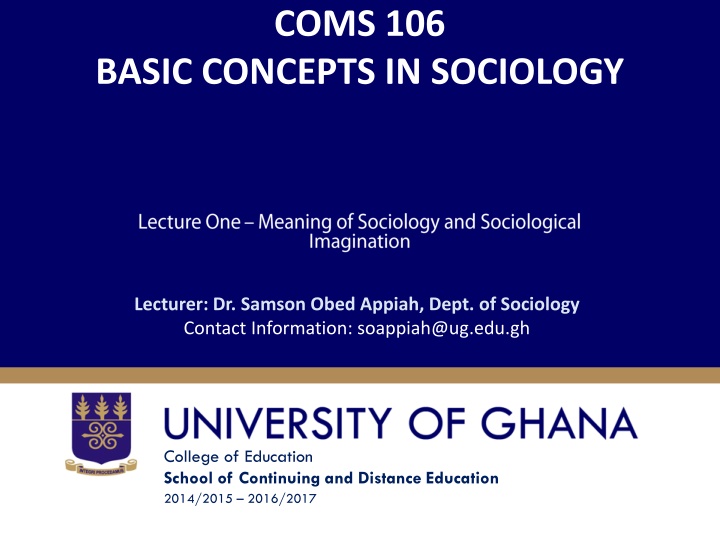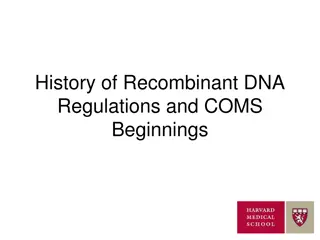
Sociology: Introduction, Concepts, and Importance
Explore the basics of sociology, including its definition, scope, and significance in understanding social interactions and organization. Delve into the concept of sociological imagination and its role in uncovering the interconnectedness between individual lives and societal contexts.
Download Presentation

Please find below an Image/Link to download the presentation.
The content on the website is provided AS IS for your information and personal use only. It may not be sold, licensed, or shared on other websites without obtaining consent from the author. If you encounter any issues during the download, it is possible that the publisher has removed the file from their server.
You are allowed to download the files provided on this website for personal or commercial use, subject to the condition that they are used lawfully. All files are the property of their respective owners.
The content on the website is provided AS IS for your information and personal use only. It may not be sold, licensed, or shared on other websites without obtaining consent from the author.
E N D
Presentation Transcript
COMS 106 BASIC CONCEPTS IN SOCIOLOGY Lecturer: Dr. Samson Obed Appiah, Dept. of Sociology Contact Information: soappiah@ug.edu.gh College of Education School of Continuing and Distance Education 2014/2015 2016/2017
Lecture Overview This Lecture seeks to introduce students to the definition, meaning, scope and subject matter of sociology as an academic discipline; It also seeks to explain how sociological imagination helps us to understand the social context in which our actions and behavior takes place. Slide 2
Lecture Objectives At the end of the Lecture, the student will be able to: Understand what sociology is all about; Understand the nature, attributes and scope of sociology; Understand the concept of sociological imagination; Explore the interconnectedness between individual life and social circumstances Slide 3
WHAT IS SOCIOLOGY WHAT IS SOCIOLOGY? Scientific and systematic study of society (Nukunya, 2015) It is the scientific study of social interactions and social organisations (Hughes and Kroehler, 2013)
What is Sociology Cont. What is Sociology Cont. Definition of Sociology Sociology is the scientific and systematic study of human social behavior, interactions and the organization of society. From the definition: Sociology is a scientific study of: Human Social Behavior; Interactions; And the Organization of Society. Slide 5
What is Sociology Cont. What is Sociology Cont. Sociologists are interested in the patterns, processes and products of social interactions; And inter-relations, their courses and implications for the individual, organization and the larger society; Slide 6
Coinage and Meaning of Sociology The term Sociology was coined in 1830 by a Frenchman Auguste Comte (1798-1857). The word Sociology is a coinage from two words of different languages: Socious (Latin): Meaning a people, a tribe or city allied to Rome but later interpreted as SOCIETY and; Logos (Greek): Meaning reason or knowledge; The word Sociology therefore means the knowledge or study of society . Slide 7
Coinage and Meaning of Sociology Cont. The coinage of the name Sociology was however preceded by the name Social Physics; The term was earlier adopted by Quetelet, a Belgian Statistician for a discipline he was developing; Comte therefore rescinded his decision to use the same name for his discipline and therefore coined the word Sociology for it. Slide 8
Coinage and Meaning of Sociology Cont. People s view about sociology may be that the subject is meant for understanding societies; People may therefore think that because they live in society, they have ample knowledge of society through their experience of living in it. Sociologists are taught about: The study of society, They learn theories and techniques of social research And therefore, sociology is defined as the academic study of society Slide 9
Sociology: Its Subject Matter, Nature and Scope Sociology is the science that studies human society, social interaction and human behavior; Society is a group of people who occupy a clearly defined geographical area, share more or less the same culture, think of themselves as one, interact and cooperate in carrying out the essential tasks of living and are organised under one political authority; Social interaction means people relate to one another and influence each other s behaviour. Slide 10
Sociology: Its Subject Matter, Nature and Scope Cont. The subject Sociology is considered a Science because, it is: Empiricalin Nature Meaning it is based on Observation and Reasoning; Theoreticalin Nature Meaning in studying society, knowledge is accumulated that is building of knowledge upon another and this process brings about theories about society; Non-Ethical Discipline Meaning it does not judge human action as good or bad, it only explains it. Slide 11
Sociology: Its Subject Matter, Nature and Scope Cont. Essentially the discipline deals with Social Groups. In dealing with Social Groups such as the family, Sociology is interested in: Their Internal Modes of Organization; The Processes that tends to maintain or change these forms of organization; And the Relations that exists among members of the group; Slide 12
Sociology: Its Subject Matter, Nature and Scope Cont. Sociology has its long-run aim in: Discovering the basic structure of human society; Identifying the main forces that hold groups together or weakens them; And unearthing conditions that transform social life. The discovery of these characteristics of human societies enables theories of human society to emerge; Sociology pursues the study of social interaction and group behavior through research governed by the rigorous and disciplined collection of data Slide 13
Sociological Imagination Unlike most ordinary people, sociologists are concerned about how social conditions influences are lives as individuals; Though individual abilities and capabilities account for our success and failure, social conditions according to a great extent also have roles to play; The ability to see social conditions as affecting people s successes and failures is what American sociologist C. Wright Mills (1959) terms Sociological Imagination. Slide 14
Sociological Imagination Cont. Sociology takes a different approach, as it stresses that individual problems are often rooted in problems stemming from aspects of society itself; This key insight informed a classic distinction between Personal Troubles and Public Issues; Personal Troubles: refer to a problem affecting individuals that the affected individual, as well as other members of society typically blames on the individual s own personal and moral failing; Public Issues lies in the social structure and culture of a society, refers to social problems affecting individual Slide 15
Sociological Imagination Cont. Society shapes our behavior and beliefs through social institutions such as Politics, Family/Marriage, Education and Health; At the same time, we shape society through our interaction with one another and our participation in social institutions; In this way, we can say that society exists as an objective entity that transcends us; But it is also a construction that is created, reaffirmed, and altered through everyday interactions and behavior; Human beings are social beings as we constantly look to others to help define and interpret the situations we find ourselves. Religion, Economy, Slide 16
Sociological Imagination Cont. We live in a society, which consists of socially recognizable combinations of individuals, relationships and groups; As well as the products of human actions statuses, roles, culture and institutions; When we behave, we do so in a social context that consist of combination of institutional arrangements, cultural influences and interpersonal expectations; Thus, our behavior in any given situation is our own, but the reasons we do what we do are rooted in these more complex social factors. Slide 17
Sociological Imagination Cont. Problems in society thus help account for problems that individuals experience; C. Wright Mills felt that many problems ordinarily considered private troubles are best understood as public issues; He thus coined the term Sociological Imagination to refer to the ability to appreciate the structural basis for individual problems; Sociological Imagination is therefore the ability to perceive situations and circumstances in a wide social context; And observe how interactions and actions influential upon other individuals and situations. Slide 18
Sociological Imagination Cont. Through sociological imagination, sociologists show that to understand individuals actions; And perhaps our own experiences, we have to understand the social context in which they take place; Sociological Imagination is a way of looking at our experiences in the light of what is going on in the social world around us; Social conditions and situations influence our behavior and actions in our everyday interactions. Slide 19
Sociological Imagination Cont. To illustrate Mill s viewpoint, let s use our Sociological Imaginations to understand unemployment as a social problem; If only a few people were unemployed, Mills argued could be attributed to their laziness and so forth; But when millions of people are out of work, unemployment is best understood as a public issue; As Mills puts it, the very structure of opportunities has collapsed and its causes lie not in the unemployed individuals but rather in our society s economic and social systems. Slide 20
Sociological Imagination Cont. The ability to see social conditions as affecting our actions and behavior as well as our successes and failures is what sociological imagination is all about; For instance, when there is large unemployment in society, sociologist will not say the individuals are lazy; Rather they would ask questions such as: What is the current economic situations in the society? Is it because of the conditions of IMF and the World Bank concerning freeze on employment in the pubic sector? Slide 21
Sociological Imagination Cont. Is youth unemployment connected to other deviate acts such as prostitution and illegal drug trade? How does youth unemployment affect other social activities such marriage and family life as well as making a living? Asking such questions and thinking about the interconnectedness between individual background; The social conditions they live in and the type of behavior they put up is what Sociological Imagination is about. Slide 22
Sociological Imagination Cont The sociological imagination involves the ability to see connection between social conditions and people s life experiences, that is successes or failures; Sociological Imagination helps us to know our limitations as people, to see linkages between our lives and historical forces and social circumstances; It also helps us to think about the ways through which we can bring desirable changes into our lives and society itself. Slide 23
Reading List Hughes, M., Kroehler, C.J. (2005). Sociology:The Core (7th Edition). Boston: McGraw-Hill Companies, Inc. (Chapter 1, Pages 6-7) Newman D,M, and O brien J, (2010), Sociology: Exploring the Architecture of Everyday Life. London: Pine Forge Press. ( Chapter1, Pages 4-8). Henslin, J.M. (2007). Essentials of Sociology: A Down-to- Earth Approach (7th Edition) Boston: Allyn and Bacon. (Chapter 1 Pages 4-10) Slide 24













